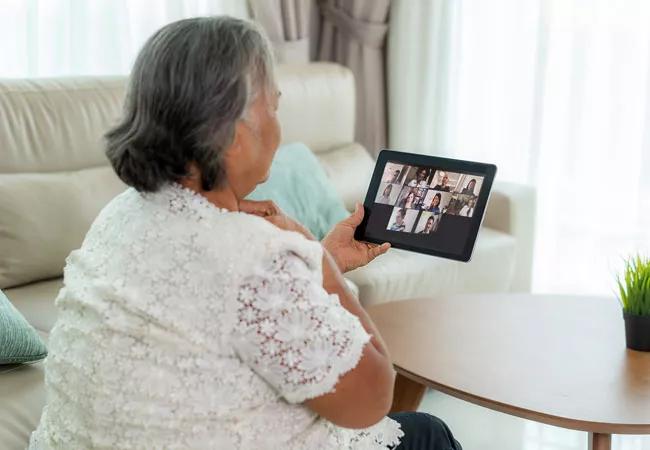Taking shared appointments virtual helped patients in unexpected ways

Image content: This image is available to view online.
View image online (https://assets.clevelandclinic.org/transform/d8903358-5fac-4427-a010-f638810a6775/21-NEU-2183758-virtual-shared-medical-appointment_650x450_jpg)
21-NEU-2183758 virtual-shared-medical-appointment_650x450
When neurologist Robert Wilson, DO, Director of Cleveland Clinic’s Autonomic Lab, had to stop his in-person shared medical appointments (SMAs) in early 2020 because of the COVID-19 pandemic, he searched for other ways to reach his patients. “I knew my patients had a need for this care, this education and this community,” he says.
Advertisement
Cleveland Clinic is a non-profit academic medical center. Advertising on our site helps support our mission. We do not endorse non-Cleveland Clinic products or services. Policy
With the help of Cleveland Clinic leadership, he started virtual SMAs for his patients with postural orthostatic tachycardia syndrome (POTS) and autonomic dysfunction in June 2020. The sessions were held every Saturday afternoon to accommodate patients’ work and life schedules. Larger sessions hosted 80 to 100 patients, and sessions of this size saw particular benefit from effective use of the chat bar during pauses.
As the pandemic intensified in the winter and vaccines emerged, Dr. Wilson noticed his patients were contacting him frequently with vaccine-related concerns. He wanted to make sure he gave them the opportunity to hear the science directly from him within the context of their autonomic disorders.
“As a doctor, discussing science is important,” he says. “But coming together to provide listening, understand where a person is coming from, and help with a patient’s concerns is also key to helping with what we call vaccine hesitancy.”
During his virtual SMAs, Dr. Wilson began educating patients about COVID-19 vaccines and the importance of being vaccinated. Feedback from his patients was positive. They said they felt more confident in their decision to be vaccinated, and they encouraged their friends and family to do the same.
“People with chronic health conditions live every day with an aspect of uncertainty, and the vaccine and pandemic became another aspect of some uncertainty,” he says. “Being sensitive and present to patients’ needs and concerns at this time is our duty and honor as caregivers.”
Advertisement
Dr. Wilson says the SMAs wouldn’t be possible without the support of his team, and he encourages other providers to be open to offering virtual SMAs. “Patients are so willing to be educated,” he says. “They are present, engaged and eager.”
Advertisement
Advertisement
Patients report improved sense of smell and taste
Clinicians who are accustomed to uncertainty can do well by patients
Unique skin changes can occur after infection or vaccine
Cleveland Clinic analysis suggests that obtaining care for the virus might reveal a previously undiagnosed condition
As the pandemic evolves, rheumatologists must continue to be mindful of most vulnerable patients
Early results suggest positive outcomes from COVID-19 PrEP treatment
Could the virus have caused the condition or triggered previously undiagnosed disease?
Five categories of cutaneous abnormalities are associated with COVID-19